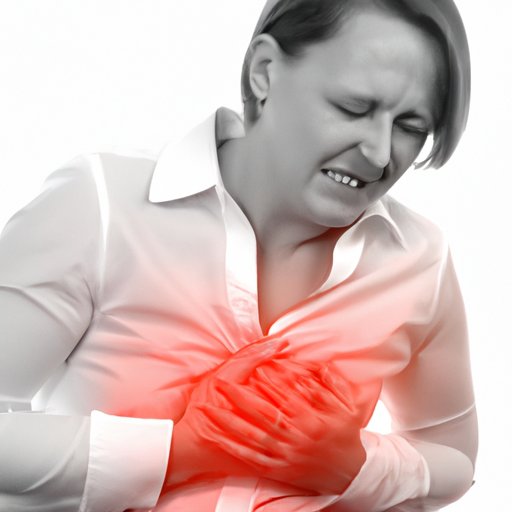
Introduction
GERD, short for gastroesophageal reflux disease, is a chronic digestive disorder affecting millions of people worldwide. It causes acid to backflow from the stomach into the esophagus, causing a range of uncomfortable symptoms that can significantly affect daily life. In this article, we will explore the symptoms of GERD, explain their causes, and discuss ways to manage them.
A Beginner’s Guide to Understanding GERD Symptoms
GERD is more than just occasional heartburn. It is a disorder that occurs when the lower esophageal sphincter (LES), a ring of muscle between the esophagus and the stomach, fails to close completely or opens too frequently. This causes acid from the stomach to flow back up into the esophagus, leading to a variety of symptoms, such as heartburn and regurgitation.
GERD can cause damage to the esophagus over time, which is why it is essential to take it seriously and seek proper treatment. Here are some of the most common GERD symptoms:
The Telltale Signs of GERD and How to Manage Them
Heartburn
Heartburn is one of the most prevalent symptoms of GERD and can feel like a burning sensation in the chest. It can also cause an acidic or sour taste in the mouth.
To avoid heartburn, try eating smaller meals and avoiding foods that are known to trigger it, such as fatty and fried foods, citrus fruits, and spicy foods. Avoid lying down for at least two hours after eating, and elevate your head and upper body while sleeping to prevent the backflow of stomach acid into the esophagus.
Regurgitation
Regurgitation is when stomach acid or undigested food flows back up into the throat and mouth, causing a sour or bitter taste. It can also lead to a persistent cough, sore throat, and bad breath.
To avoid regurgitation, eat slowly and chew your food thoroughly. Stay upright for at least 30 minutes after eating, and avoid lying down right after meals. Wearing loose-fitting clothing may also help to relieve pressure on the stomach.
Chest pain
Chest pain is a common symptom of GERD and can be mistaken for a heart attack. Chest pain caused by GERD can feel like a crushing or squeezing sensation in the chest and may radiate to the back, neck, or arms.
If you experience chest pain, seek medical attention immediately to rule out any serious underlying conditions. To manage chest pain caused by GERD, avoid foods that trigger it and take prescribed medications as directed.
Difficulty swallowing
Difficulty swallowing, also known as dysphagia, can be caused by inflammation or narrowing of the esophagus due to long-term exposure to stomach acid. It can cause a sensation of food getting stuck in your throat or a feeling of choking.
If you experience difficulty swallowing, see your doctor right away. They may recommend an endoscopy, a procedure that uses a flexible tube with a camera to examine the esophagus. To manage difficulty swallowing caused by GERD, medication or surgery may be necessary, depending on the severity of the condition.
Hoarseness or sore throat
Hoarseness or a sore throat is a common symptom of GERD, caused by the irritation of the throat lining by stomach acid. It may also cause a chronic cough, particularly at night.
To manage hoarseness or sore throat, avoid smoking, as it can worsen the condition. Drink plenty of water and stay hydrated, and use throat lozenges to soothe the throat.
Chronic cough
A chronic cough, lasting eight weeks or longer, is another common symptom of GERD. It occurs when stomach acid irritates the throat lining and triggers coughing.
To manage chronic cough, avoid triggers such as smoking, alcohol, and certain foods, and take prescribed medications as directed.
Detecting GERD Symptoms Early: What You Need to Know
It’s important to detect GERD symptoms early to prevent long-term complications. If GERD is left untreated, it can increase the risk of developing Barrett’s esophagus, a condition that raises the risk of developing esophageal cancer.
Your doctor can diagnose GERD by performing a physical exam and taking a detailed medical history. They may also recommend an upper endoscopy, a procedure that uses a flexible tube with a camera to examine the esophagus and stomach. Other tests, such as a PH test and a manometry test, can also help to diagnose GERD.
Don’t Ignore These Warning Signs of GERD
While most GERD symptoms can be managed with lifestyle changes and medication, certain warning signs require immediate medical attention:
- Difficulty swallowing or breathing
- Chest pain that is severe or radiates to the arms, neck, or back
- Bleeding from the mouth or rectum
- Sudden weight loss
- Loss of appetite or trouble eating
If you experience any of these warning signs, seek immediate medical attention.
Everything You Need to Know about GERD Symptoms and Treatment Options
GERD is a chronic condition, but with proper diagnosis and treatment, it can be effectively managed. Lifestyle changes and medication are the first line of defense against GERD symptoms. If these measures fail, surgery may be necessary.
If you have GERD, it’s crucial to work closely with your healthcare provider to find the most effective treatment plan for you. In addition to medication and lifestyle changes, natural remedies such as herbal teas, yoga, and acupuncture may also be helpful.
For more information about GERD and its treatment options, visit your healthcare provider or refer to reliable sources such as the American Gastroenterological Association and the National Institute of Diabetes and Digestive and Kidney Diseases.
Conclusion
If you are experiencing any GERD symptoms, it’s essential to take them seriously and seek medical attention if necessary. With the right treatment plan, GERD can be effectively managed, and you can enjoy a comfortable and fulfilling life. Remember to eat a healthy diet, avoid trigger foods, and stay hydrated for optimal digestive health.





